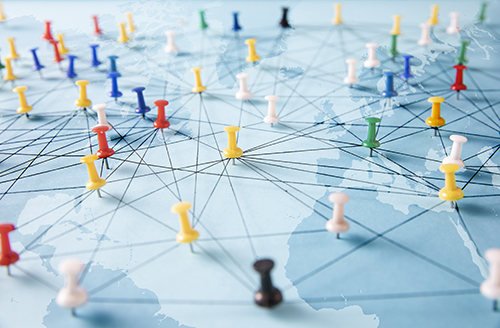
According to IFCC, in financially strapped regions of the world “the extent and quality of laboratory testing lags behind what is accepted in advanced economies.” With resources scarce, the quality of testing provided by clinical laboratories in less developed countries can vary greatly based on the location of the laboratory, with well-equipped and well-organized laboratories existing alongside those with out-of-date instruments and lacking well-educated technicians. Laboratorians in developing areas of the world benefit from training to equip them with necessary tools to improve their techniques, with the ultimate goal of improving patient care and outcomes.
AACC uses its influence and resources to promote international coordination around sharing best practices for laboratory medicine. Through the Global Lab Quality Initiative (GLQI), AACC aims to advance the practice and profession of clinical laboratory science and its application to healthcare, especially in countries with critical need.
Formerly known as the Emerging Countries Program, GLQI was designed to provide educational programming that reflects the needs of laboratory professionals worldwide. The initiative launched its first workshop in 2011 in Quito, Ecuador. The program, which began with one working group that focused solely on the Latin America and Caribbean region, now has two additional regionally focused working groups for the African region; a newborn screening program; and a cardiac point-of-care test training program that launched in 2020 in partnership with the CDC and the CDC Foundation.
To date, AACC has presented 22 quality control and method verification workshops in 20 countries in the Latin American and Asia-Pacific regions, as well as three newborn screening workshops in Colombia, India, and Morocco.
Over the past 2 years, AACC’s international efforts have been hampered by civil unrest in target countries and the COVID-19 global pandemic. Just a few weeks before the U.S. enforced a lockdown in 2020, Olajumoke Oladipo, MBBS, DABCC, chair of the GLQI Africa Working Group (AWG), traveled to Addis Ababa and Mekelle, Ethiopia to conduct pre-workshop site visits to about 10 private and public laboratories. However, the workshops planned that year never transpired due to the pandemic, and more recently, plans for Ethiopia are on hold indefinitely due to ongoing civil strife.
Despite these setbacks, the AWG continues its work by cultivating closer ties with leaders of the African Federation of Clinical Chemistry (AFCC), specifically in collaborating on educational initiatives and seeking guidance on priority countries with the most need for a GLQI workshop. As a result of ongoing conversations between Oladipo and AFCC president Rajiv Erasmus, PhD, the AWG will present a virtual symposium during the AFCC’s regional hybrid event in November 2021—a steppingstone for AACC educational initiatives in the region.
The Asia-Pacific Working Group (APWG) is forging ahead as well, and has worked closely with the leaders of the Mongolian Association of Health Laboratorians to mutually decide on postponing a planned in-person workshop in Ulaanbaatar until 2022. In addition, the APWG is in the beginning stages of developing a web-based quality management troubleshooting tool to help guide and support laboratorians in Asia-Pacific countries. The application will be a continuation of GLQI workshops, reinforcing lessons learned, and providing key points on method evaluation. Victoria Zhang, PhD, APWG chair, emphasized that the goal is for this training program to be sustainable given the great feedback on AACC’s in-person workshops. “The workshops are still limited in terms of attendees’ access to the program and the frequencies for the onsite visit,” Zhang said. “The web-based quality management program would be complementary to our onsite in-person workshops. This would provide additional, continuous, and dynamic resources for laboratorians in developing countries as they work on their laboratory quality programs. The APWG also hopes to work with the IFCC to make the web-based program accessible to countries beyond the Asia-Pacific region and serve more people globally.”
This year, the Latin American Working Group (LAWG), the pioneering working group that set GLQI in motion, launched a quarterly Spanish-language webinar series. Veronica Luzzi, PhD, chair of the LAWG, described LAWG’s strategy to cover the gaps identified in specific countries in the Latin America and Caribbean (LAC) region, which involves continuous improvements in quality management and method verification. “In these last few months, we have learned to be more creative about sharing our expertise and experiences in the clinical laboratory and are creating webinars that can be accessed virtually,” Luzzi said. “We plan to continue creating a virtual platform for our LAC colleagues to access.”
Additionally, Luzzi and Rosa Sierra-Amor, PhD, who serves as LAWG senior advisor, worked with the Sociedad Boliviana de Bioquímica Clínica, the Bolivian national clinical chemistry society, to explore options other than an in-person workshop; however, it was ultimately decided to postpone this year’s workshop to allow for an in-person event in the fall of 2022. LAWG members will also present a Spanish-language session during the 2021 AACC Annual Scientific Meeting titled, “Risk Management in the Clinical Laboratory: Tools to ensure high-quality results,” as well as a symposium during the Latin American Confederation of Clinical Biochemistry’s (COLABIOCLI) congress in Leon, Guanajuato, Mexico in the spring of 2022.
AACC’s goal is for its global initiatives to continue to support AACC’s strategic goals of promoting the value of laboratory medicine and promulgating scientific advancement internationally, especially in underserved regions of the world. This can be accomplished through GLQI’s robust activities in the three strategic global regions and partnering on educational initiatives with like-minded societies around the world.
To get involved in the AACC GLQI program, email [email protected].